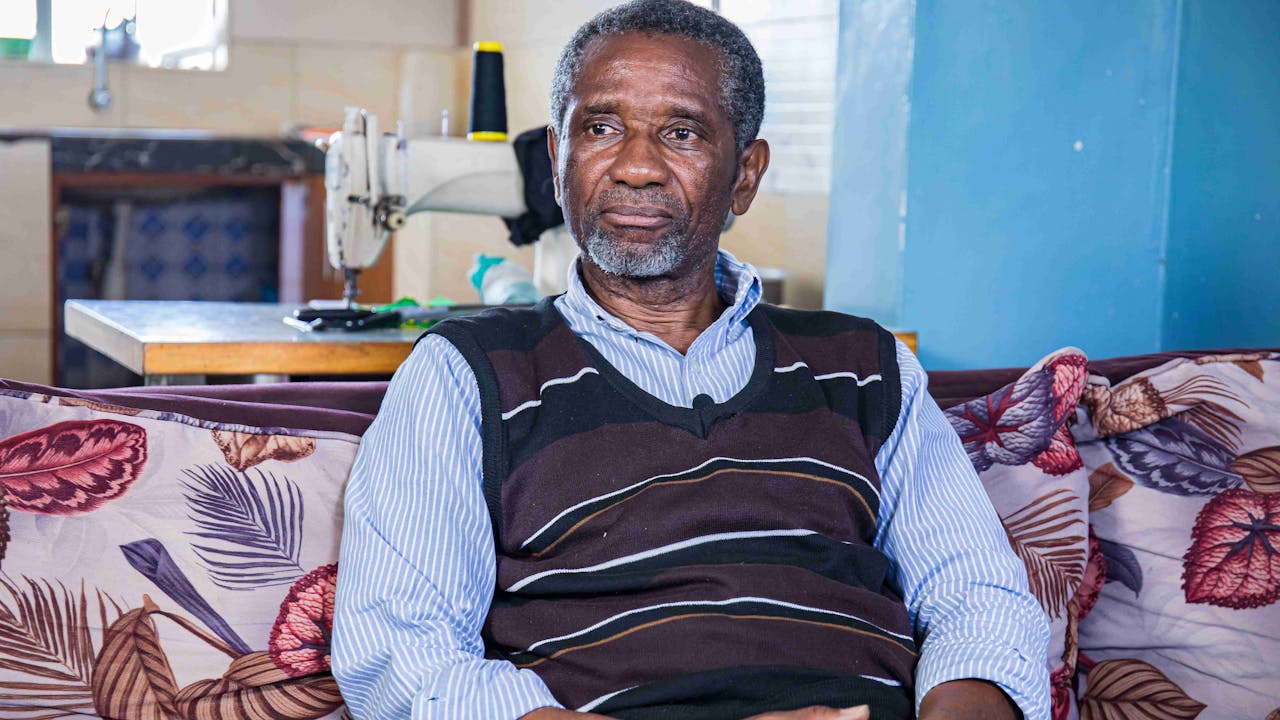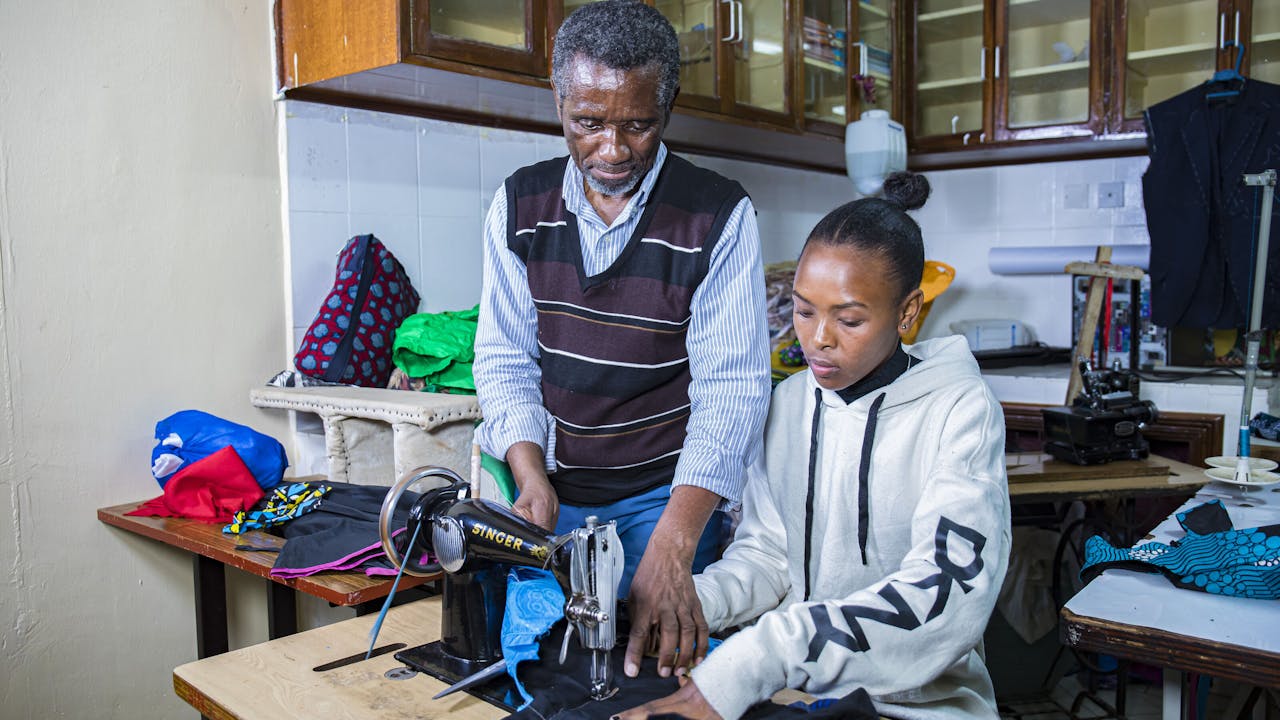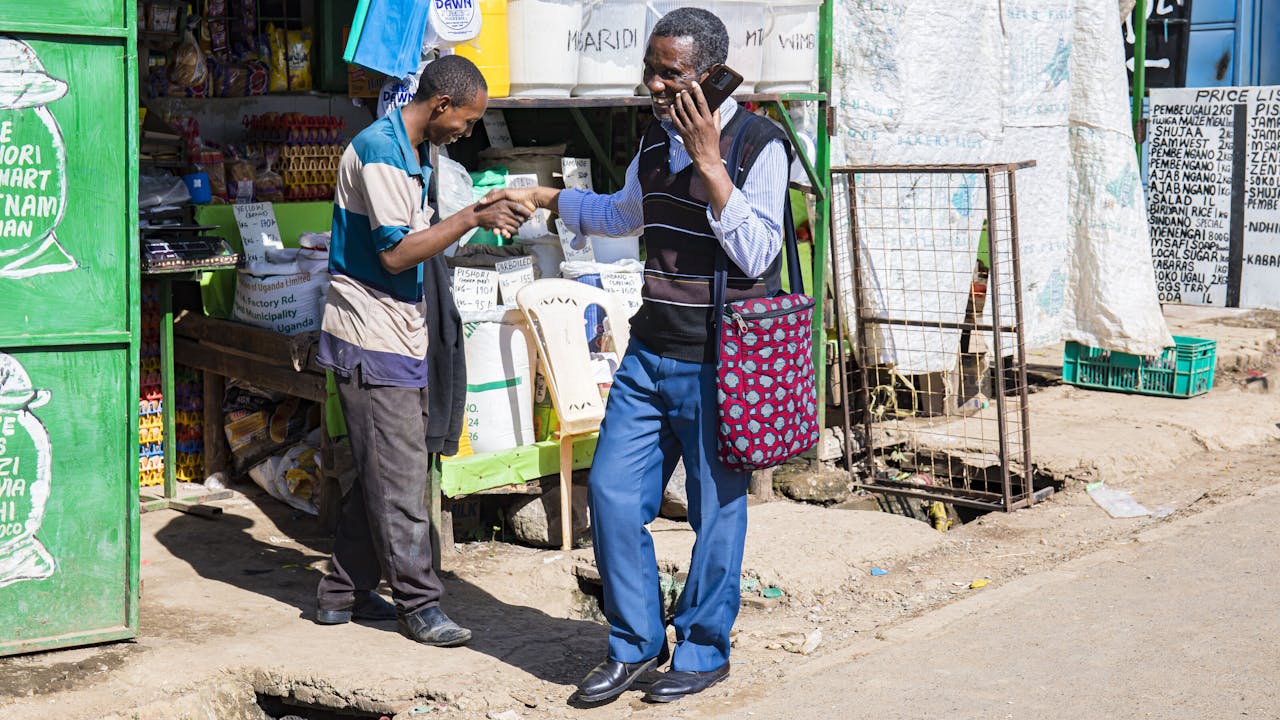Despite my skills and experience, when I was invited to become a tailoring trainer, I worried about my lack of certification. As a refugee, I no longer had access to my official documents. When I found the Recognition of Prior Learning (RPL) programme, new horizons opened for me.
Celestin is my first name, and I am from the Fizi region in South Kivu, in the Democratic Republic of Congo (DRC).
Before 2000, I lived in DRC and worked as a Disciplinary Director at a school. I had studied and achieved a diploma in Pedagogy.
My job at the school was to supervise and guide the students and ensure that the school stayed clean. I also kept the keys for the doors, as I was responsible for closing the classrooms.
I was not highly qualified though, as I had just started working there.
One Friday night, people began running towards us. When they arrived, they told us that war had started.
That night, we stayed awake in utter silence until 5am. The next morning, there were gunshots. Those who managed to escape brought us news and we realized the situation was escalating.
People started running and fleeing. At that time, my wife and kids were heading to our home, and they were caught in the crossfire. My wife died, but my children survived.
My friends and I were arrested and taken away. Since we were young, they said we were rebels.
I don't like talking about what happened after we were taken to prison because many people died. I almost died too, but one evening, I was told to go outside to dispose of the waste from our cell.
It was around 7pm, and it was dark. Myself and another young man who had been shot went out. That's when we got the opportunity to run away.

After everything that happened back home and the things that were done to us in prison, I should have died. However, I am alive because God wanted me to continue living. (Nairobi, Kenya, 2024)
© Dan Lukoye/ILOWe went to a nearby town and there we found trucks transporting wood. We got into the back of a truck and left. I didn't know when we crossed the borders. But, by the time we were dropped off, we were in Kenya.
I have been here for over 20 years now and haven't been back to DRC since.
Once we arrived in Nairobi, we were taken to the UNHCR in Westlands. I stayed there for over eight months, sleeping in boxes.
Later, I was directed to a place with cheap rentals. I rented a single room made of iron sheets. Life went on from there.
Back home in DRC, I had learned tailoring and had made a few things. But I had never earned money from being a tailor as I had another job that catered to my needs.
When I came to Kenya, I started to make clothes. After some time, I made friends with the tailors in Westlands, and joined them. I would sew, and whatever I earned, I would pay a little to them. The remaining amount would be enough for a meal.
My lack of a certificate troubled me. How could a trainer instruct without proper certification?

When I left Westlands, I moved to an iron-sheet house in Kangemi, where many refugees were staying. Later, I relocated to Kabiria and worked for a woman named Sarah. It was from the salary she provided that, in 2004, I purchased a sewing machine.
Still, my biggest challenge was that I did not have my training certificates and I could not afford to get a new one. If I didn't have a certificate to show people, then who would believe that I went to school? No one. Nonetheless, I decided to leave all that behind and focus on what was ahead.
Sometime later, when the Africana organization began seeking individuals skilled in sewing, I was invited to teach single women and single mothers.
But my lack of a certificate troubled me. How could a trainer instruct without proper certification?

This is my passion. I started my work at a school, and I wanted to continue, but I was not able to because of the war. (Nairobi, Kenya, 2024)
© Dan Lukoye/ILOThankfully, I discovered an opportunity to have my skills tested and to receive a Recognition of Prior Learning (RPL) certification.
At first, I questioned the authenticity of this certificate because I believed formal education was required to attain one. Nevertheless, I decided to proceed.
I underwent the examination. To my surprise, I passed while others did not. I achieved Grade 1, meaning I can construct a coat and a suit.
Now, I can serve as a teacher with credentials. I pass on knowledge to my students. Many of my former students are progressing because of what they've learned.

I think the RPL programme is good, especially for refugees. The challenge is moving forward: who will guide you? How will you be supported? (Nairobi, Kenya, 2024)
© Dan Lukoye/ILOToday, I'm optimistic. With the RPL certificate, the opportunities are limitless, both locally and internationally. RPL serves to identify those excelling in their field for academic recognition. That's the essence of RPL.
The ILO says that if you have the certificate, you can go to places outside of Kenya. Knowing this makes me happy.
There are still some challenges. Even with this certificate, if I apply for a job in an Export Processing Zone (EPZ), they ask for a work permit and ID, which I don't have.
Integration for refugees is happening, but it's not fully realized yet.
Today, I'm optimistic. With the RPL certificate, the opportunities are limitless, both locally and internationally.

My desire would be to attain a higher level than this. I was told that the RPL certificate means that I could go to university.
For now, finding money for this is tough. I have responsibilities; a family to feed, rent to pay. But the RPL brings me hope to continue this journey.
One day, I plan to start my own school and afterwards open two to three schools.
For refugees, finding work is hard. Enhancing our education helps a lot.
Bringing the RPL certification to other countries would be great. It would boost the economy and reduce refugees' reliance on organizations.
